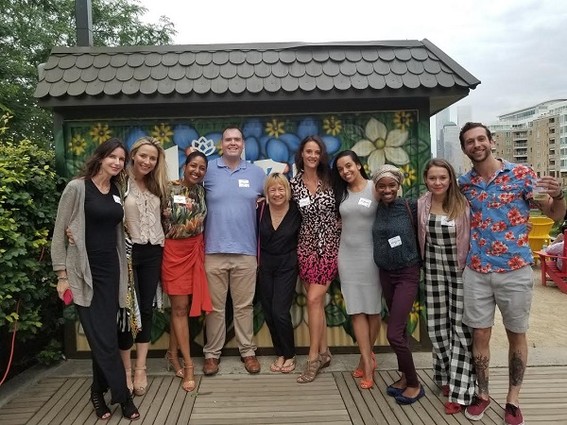There’s a Long, Hard Road for Sex Tech Entrepreneurs, Speakers Say at Jersey City Tech Meetup

After four years of striking out with venture capitalists, entrepreneur Cindy Gallop finally raised the $2 million she needed in January to hire a full-time staff and rapidly grow her website.
Gallop needed to hire a UX designer. She wrote a straightforward job description with all the specifications she needed. And she posted the job on a popular platform for freelancers looking for work.
“Twenty minutes later, they took it down,’’ Gallop recalled. “We asked them why and they told us, ‘No adult content.’”
Gallop has heard “No” a lot. She is a sex tech entrepreneur and founder and chief executive officer of Make Love Not Porn, based in Manhattan. It’s billed as the first social sex video-sharing platform, socializing and normalizing sex to make it easier for people to talk about it openly and honestly to promote good sexual values and behavior, she said.
“For me and every other sex tech entrepreneur in this industry, the single most pressing issue when it comes to building our businesses is the fact that every single piece of business infrastructure any other tech startup can just take for granted we can’t because the small print always says no adult content,” she said.
That’s not all, she and other female sex tech entrepreneurs say. Need bank backing? Or credit card payment processing? Or an e-mail partner? “No. No. And no,” they say.
The hurdles they face have gone unnoticed. Jersey City Tech Meetup, which hosts monthly meetings, lending an ear to experts from the various technology, business and entrepreneurial communities, heard about the issue.
The group hosted gatherings a year ago and again in June, inviting Gallop and other female leaders in the industry to share their their stories.
Both meetings sold out. In June, Gallop was joined by Bryony Cole, Polly Rodriguez and others to talk about the industry and its future.
Dan Sullivan, the outgoing organizer and founder of Jersey City Tech Meetup, said, “New Jersey has never ever held an event focused on this topic so I was really glad to be the host.”
“Last year, there was no funding. They were doing 100 pitches or more to some well-known venture capitalists and they would all hear the same thing. No,” he said.
“This year, some funding is coming their way. It’s been a year of moving forward,” he said. “Things are changing in a positive way and technology has a huge part to do with that. Because people tend to gravitate towards technology and understand technology.”
Ben Yurcisin, the tech meetup’s lead organizer, noted the female sex tech entrepreneurs support each other and collaborate to gain momentum for all female sex tech leaders.
In Gallop’s case, she eventually found a banker after a four-year search. The business was rejected at least six times before it found an e-mail partner.
Gallop, 58, told her staff “after five and a half years of operations, the biggest thing we have to celebrate is we are still here. Because the tech and business world has been trying to kill us from day one.”
She wants to change what she sees as a troubling social dynamic.
“When total freedom of access to porn online meets our society’s equally total reluctance to talk openly and honestly about sex, porn becomes sex education by default,” she said.
She wrote a book called Make Love Not Porn: Technology’s Hardcore Impact on Human Behavior (TED Books) and established Make Love Not Porn. What followed was a growing global connection to female sex tech entrepreneurs who couldn’t get funding.
“I realized I had a unique access to extraordinary sex tech deal flow. To get my own startup fully funded, I’m just going to have to get the entire category funded,” she said. “I decided to raise $200 million to start the world’s only sex tech fund.”
The fund is called All The Sky Holdings. Through All The Sky Holdings, Gallop wants to fund innovative sex tech ventures founded by women. And fund the infrastructure of sex tech, creating a huge revenue generator.
“When you truly have a world-changing startup, you have to change the world to fit it and not the other way around,” she said. “If reality tells me that I cannot grow my startup the way I want to, then I’m going to change my reality.”

